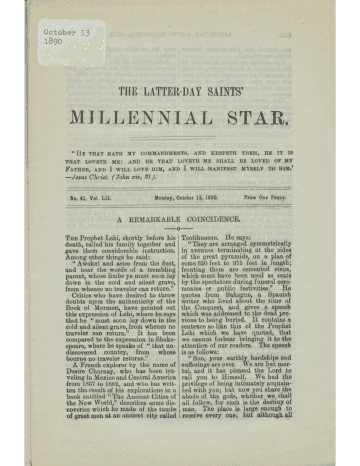Magazine
A Remarkable Coincidence

Title
A Remarkable Coincidence
Magazine
The Latter Day Saints' Millennial Star
Publication Type
Magazine Article
Year of Publication
1890
Authors
Cannon, George Q. (Primary)
Pagination
641–642
Date Published
13 October 1890
Volume
52
Issue Number
41
Abstract
Lehi, in his final farewell to his family, stated that he “must soon lay down in the cold and silent grave, from whence no traveler can return” (2 Nephi 1:14). Inasmuch as similar words appear in the writings of William Shakespeare, Church critics believe that Joseph Smith borrowed the Book of Mormon statement from Shakespeare. However, in the ruins of Mexico similar words have been found to have been used in an ancient funeral speech.
A REMARKABLE COINCIDENCE.
The Prophet Lehi, shortly before his death, called his family together and gave them considerable instruction. Among other things he said:
“Awake! and arise from the dust, and hear the words of a trembling parent, whose limbs ye must soon lay down in the cold and silent grave, from whence no traveler can return,”
Critics who have desired to throw doubts upon the authenticity of the Book of Mormon, have pointed out this expression of Lehi, where he says that he “must soon lay down in the cold and silent grave, from whence no traveler can return.” It has been compared to the expression in Shakespeare, where he speaks of “that undiscovered country, from whose bourne no traveler returns.”
A French explorer by the name of Desire Charnay, who has been traveling in Mexico and Central America from 1857 to 1882, and who has written the result of his explorations in a book entitled “The Ancient Cities of the New World,” describes some discoveries which he made of the tombs of great men at an ancient city called Teotihuacan. He says:
“They are arranged symmetrically in avenues terminating at the sides of the great pyramids, on a plan of some 620 feet to 975 feet in length; fronting them are cemented steps, which must have been used as seats by the spectators during funeral ceremonies or public festivities.” He quotes from Sahagun, a Spanish writer who lived about the time of the Conquest, and gives a speech which was addressed to the dead previous to being buried. It contains a sentence so like this of the Prophet Lehi which we have quoted, that we cannot forbear bringing it to the attention of our readers. The speech is as follows:
"Son, your earthly hardships and sufferings are over. We are but mortal, and it has pleased the Lord to call you to Himself. We had the privilege of being intimately acquainted with you; but now you share the abode of the gods, whither we shall all follow, for such is the destiny of man. The place is large enough to receive every one; but although all are bound for the gloomy bourne none ever return.”
The closing sentence is similar to the language of Shakespeare, though it may well be supposed that the people who used this form of speech never had heard of William Shakespeare.
This proves that men of various nations may express themselves concerning a subject so interesting to them as death and burial in somewhat similar language, though they may be as wide apart as the antipodes.
Lehi speaks of the grave “from whence no traveler can return.” The ancients who dwelt at the city of Teotihuacan speak about the grave and say, “although all are bound for the gloomy bourne, none ever return;” and William Shakespeare, writing in English, speaks of “that undiscovered country, from whose bourne no traveler returns.”—Geo. Q. Cannon in The Juvenile Instructor.
Subject Keywords
Bibliographic Citation
Terms of use
Items in the BMC Archive are made publicly available for non-commercial, private use. Inclusion within the BMC Archive does not imply endorsement. Items do not represent the official views of The Church of Jesus Christ of Latter-day Saints or of Book of Mormon Central.